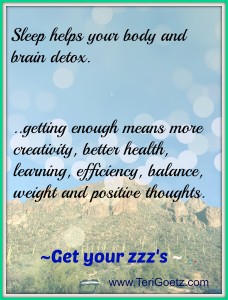 We’ve become such a 24/7 society, and have gotten so accustomed to unhealthy behaviors that we’ve reached an epidemic of feeling lousy. We push through to make deadlines, work long hours and even through vacation, and we simply don’t pay attention to the way our body feels. We ignore the messages it is giving us. And stress? Well, life is stressful…and we plow through. But, plowing through life makes you sick, overweight, and foggy-headed!
We’ve become such a 24/7 society, and have gotten so accustomed to unhealthy behaviors that we’ve reached an epidemic of feeling lousy. We push through to make deadlines, work long hours and even through vacation, and we simply don’t pay attention to the way our body feels. We ignore the messages it is giving us. And stress? Well, life is stressful…and we plow through. But, plowing through life makes you sick, overweight, and foggy-headed!
Sleep is one of the most important pieces of the picture. Our 24/7 lifestyle keeps us up longer and plugged in to technology. What that does to our bodies and brains is pretty staggering.
When we get enough sleep:
- we are more alert and focused, which means we
- learn more efficiently
- consolidate memory (which is essential for learning new information)
In other words, with good sleep—and I’m talking a minimum of 7 to 8 hours, you function better and are just plain happier.
After a good night’s sleep, it’s easier for us to keep a positive state of mind, have fewer arguments, and eat less. When we’re tired, we tend to eat simple carbs (without even realizing it) for that quick sugar burst to stay awake…but then we crash — and it becomes a vicious cycle SO, lack of sleep also leads to weight gain. Also, the hormone leptin, which gives us the sense of being satiated falls if you’re not getting enough sleep. Not only that, but the hormone that signals hunger, ghrelin, rises. I’m pretty sure that’s an old survival thing.
We also have more accidents when we’re tired! Neurons don’t fire optimally — and that affects both thinking and physical movement. Judgment becomes impaired in both decision making and physical activities.
Sleep impacts mood, motivation, judgment, and our perception of events. New studies show that it is when we are asleep that the brain makes changes in its own structure and organization. Sleep provides the necessary down-time for our bodies to rest. AND very importantly: during sleep the body is detoxifying. We forget about that!
Sleep deprivation increases our stress hormones, which results in fewer new brain cells being made! And we need all the brain cells we can get, right?
Here’s something super cool. New research indicates another clue about why sleep is really important for brain health. It seems like our brains remove waste through a system called the glymphatic system. During sleep, the brain cells shrink as much as 60% so that harmful proteins, which are linked to brain disorders like Alzheimers, can be released.
The brain is not included in the lymphatic systems, because of the blood brain barrier which protects it. So the brain has its own system for clearing waste from its cells, piggybacking on the blood system. Basically cerebrospinal fluid “washes out” the brain and then deposits the junk is cleans out into the body to be cleared out through the liver.
Now, of course, your liver needs to be in good working order…and we’ll talk about that next time when we talk about detoxification and diet.
So, I think you understand why getting a good night’s sleep is super important.
And for those of you who have been in my tribe for a while, you may not have my latest free offering, “Five Things Your Doctor May Not Know about Your Health.” If you’d like to read more about this subject, go to the top or bottom of this page to get my new free booklet. In it, I talk more specifically about tricks for a better night’s sleep.
 Back in the 50s, when the research first showed up about stress affecting the immune system, the medical community started to pay attention. But, they only knew a piece of the story. Since then, we have learned so much more. Current research shows that stress
Back in the 50s, when the research first showed up about stress affecting the immune system, the medical community started to pay attention. But, they only knew a piece of the story. Since then, we have learned so much more. Current research shows that stress
